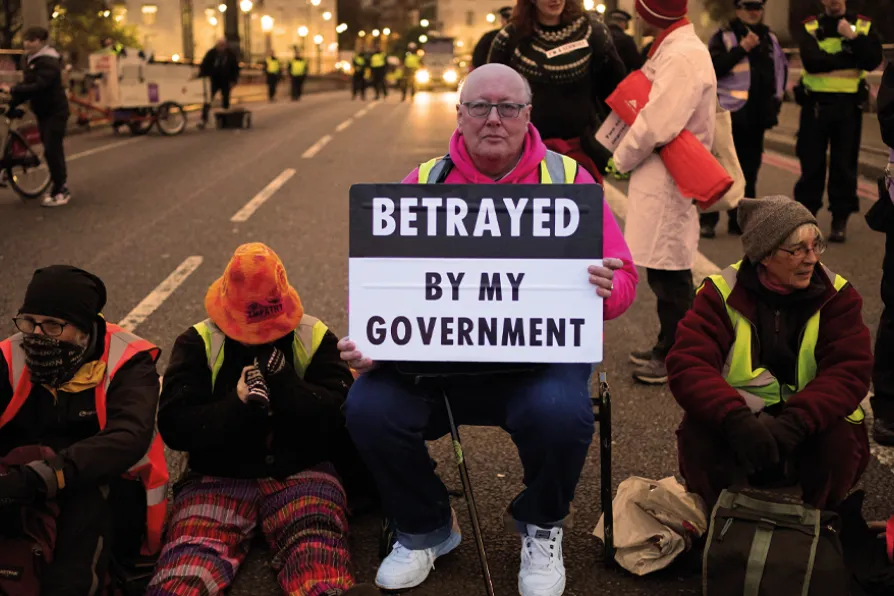Labour prospects in May elections may be irrevocably damaged by Birmingham Council’s costly refusal to settle the year-long dispute, warns STEVE WRIGHT

 Supporters of the nine jailed Insulate Britain climate activists take part in a road block demonstration on Lambeth Bridge in central London, November 20, 2021
Supporters of the nine jailed Insulate Britain climate activists take part in a road block demonstration on Lambeth Bridge in central London, November 20, 2021
PROTESTS by Insulate Britain activists demanding that the government act to properly insulate Britain’s housing stock — hence reducing energy consumption — have made media headlines. The blocking of roads has been widely reportedly and condemned mainly by those who don’t like any protest whatever it is.
There has been debate on the left, which will continue, about whether the tactics used are the most effective way of getting the government to act. Civil disobedience relies on the resilience of activists but may not always build a movement that can achieve change.
One thing the protests have achieved is a crackdown from Home Secretary Priti Patel. Again here we need to be careful though. Ms Patel did not require Insulate Britain to try and restrict the democratic right to protest. She was already planning it and will continue trying to do it unless mass opposition can stop her.
However in the immediate moment that has left Insulate Britain protesters on the front line.
Nine Insulate Britain protesters were jailed on November 17 for breaking an injunction not to block roads in climate change protests.
Solidarity with the protesters seemed in short supply. John McDonnell to his credit made a speech defending them outside the court. The Guardian by contrast had no words of support but rather a feature asking why so many people found Insulate Britain “annoying.” It might be reflected that annoying Guardian readers is at least a start in making an effective protest.
To a casual observer it could have seemed odd that a government committed on paper to take action on climate change determined that the key action to be taken after Cop26 was to jail those who pressed for action.
One of those in court made the point that if protesters were jailed, more would come forward. This seems likely — and there is a well-known precedent in British history.
Around the period of Peterloo in 1819 the (Tory) government was determined to crack down on radical opinion and calls for democratic rights. Prosecutions for seditious libel were common and the taxes on knowledge (levied on newspapers) saw the rise of an unstamped, illegal press. Many who published it went to jail, but that didn’t stop publication.
One of the best known was the freethinker Richard Carlile. In the early 1820s he ran a radical bookshop in Fleet Street known as the Temple of Reason. Carlile was frequently jailed but he had an important principle: “The shop in Fleet Street will not be closed as a matter of course.”
It wasn’t. Before the government finally gave in, 150 volunteers, shopmen, printers and news vendors had been jailed and served over 200 years of imprisonment between them.
Whose were these people? EP Thompson noted in the Making of the English Working Class: “The men and women who came forward were, in nearly every case, entirely unknown to Carlile. They simply came out of London; or arrived on the coach from Lincolnshire, Dorset, Liverpool and Leeds. They came out of a culture.”
Interestingly though, Thompson was also clear that while those who broke the law and fought for press freedom were part of the rise of a radical working-class movement, they themselves were not usually workers, with the power to organise and challenge capital at the point of production, but artisans.
However the reading culture they promoted and developed fed into the rising working-class movement and was one of the motors for Chartism from the later 1830s.
Perhaps the protests of Insulate Britain won’t change the world — but they might help create a movement that does.

Inspired by a hit TV show, KEITH FLETT takes a look at the murky history of undercover class war

It’s not just the Starmer regime: the workers of Britain have always faced legal affronts on their right to assemble and dissent, and the Labour Party especially has meddled with our freedoms from its earliest days, writes KEITH FLETT

The government cracking down on something it can’t comprehend and doesn’t want to engage with is a repeating pattern of history, says KEITH FLETT











